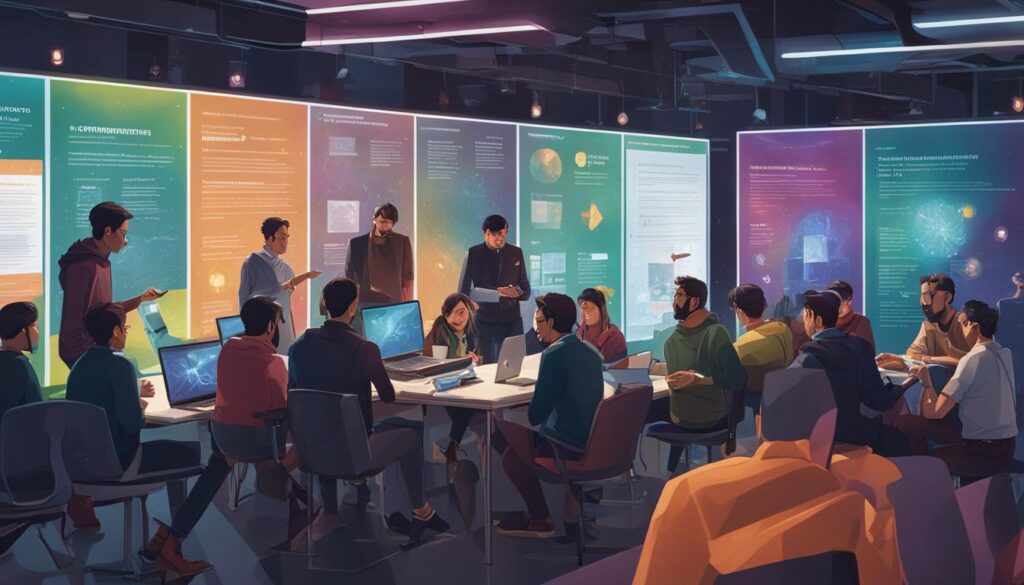The exhilarating realm of quantum computing beckons, a frontier teeming with the promise to overhaul everything from cryptography to climate change. But before one can harness this cosmic power, getting a grip on its basics is an absolute must.
Begin your odyssey through the quantum realms with the best quantum computing book selections tailored for every neophyte’s arsenal. Our meticulously compiled quantum computing guide is your gateway to turning theoretical perplexities into digestible bites of quantum clarity. These tomes aren’t just books; they’re vessels ferrying you across the chasms of quantum quandaries.
Enlist in a cerebral adventure with resources handpicked for their ability to elucidate the abstruse: from the novice-friendly narrations to comprehensive coverage your curiosity craves. These texts serve as your faithful companions, as you transition from quizzically peering into the quantum abyss to becoming a savvy scribe of the subatomic. Whether you seek a starting point or the next step, we’ve spotlighted the quantum computing resources you’ll need to brave this brave new world.
Key Takeaways
- Embark on a clear-cut quantum voyage with top recommended reads for beginners.
- Transform from quantum curious to quantum confident with user-friendly guides.
- Acquire the keys to unlock the enigmatic secrets of quantum mechanics and algorithms.
- Dive into practical quantum programming with dedicated texts featuring Python and Q#.
- Empower yourself with the knowledge to contribute to the next information technology revolution.
- Understand the real-world impact of quantum computing on various industries.
Beginner-Friendly Quantum Computing Books
Dipping your toes into the vast ocean of quantum computing can be intimidating, but fear not! The cresting wave of technology has brought forth a trove of beginner-friendly guides to help you wade through the quantum waters. Let’s unravel the mysteries of the quantum universe with some of the top quantum computing books out there. Ideal for the uninitiated, these publications lay down the bedrock for your quantum journey without you having to solve Schrödinger’s cat puzzle first.
For the quantum curious, a treasure chest of knowledge awaits within the pages of Chris Bernhardt’s “Quantum Computing for Everyone”. Taking an almost storyteller’s approach, Bernhardt eases you into the field, making it less quantum quagmire and more quantum quest. A touchstone for those embarking on a quantum computing for beginners path, this book is your faithful first mate.
“Quantum Computing for Everyone” by Chris Bernhardt
Next in line to brighten the bulb in your quantum lighthouse is the dynamic duo of Eleanor Rieffel and Wolfgang Polak with their tome, “Quantum Computing: A Gentle Introduction”. Not only does it serve as a beacon for beginners, but it also paves a comprehensible route through the thicket of complex principles and algorithms. Picture it as your quantum compass, pointing out the mathematical North in a sea of abstraction.
“Quantum Computing: A Gentle Introduction” by Eleanor Rieffel and Wolfgang Polak
Finally, if you’re itching to roll up your sleeves and get your hands digitally dirty, look no further than “Learn Quantum Computing with Python and Q#” by Sarah C. Kaiser and Chris Granade. This guide doesn’t just talk the quantum talk—it walks you through a practical quantum computing workshop filled with real-world coding exercises. It’s a straight passage to becoming a quantum code whisperer!
“Learn Quantum Computing with Python and Q#” by Sarah C. Kaiser and Chris Granade
So, whether your backdrop is a classical study or a quirky coffee shop, these beginner books are your ticket to the quantum realm. Forge ahead, dear reader, and let each page turn be a step into the heart of quantum mechanics and beyond!
Transitioning to Intermediate Quantum Computing
As you leap from foundational quantum principles to tackling intermediate quantum computing, it’s akin to stepping through a portal into an arena where the players are slicker, the algorithms quirkier, and the rewards grander. But worry not, with the right quantum computing education, this transition can be as smooth as a qubit in superposition.

Building a Strong Foundation in Quantum Computation and Information
Imagine having the cosmic encyclopedia of quantum algorithms within arm’s reach. That’s what “Quantum Computation and Quantum Information” by Michael A. Nielsen and Isaac L. Chuang offers to intrepid learners looking to deepen their quantum prowess. This seminal text takes you on an expedition through complex topics like quantum error correction with the rigor of a cryptographer parsing a great cipher.
Verifying Your Understanding Through Practical Guides and Applications
For those who feel cozier in the workshop than the library, “Programming Quantum Computers” by Eric R. Johnston, Nic Harrigan, and Mercedes Gimeno-Segovia, serves as a quantum spanner in the works of theory. It is where you roll up your sleeves and get hands-on experience with quantum programming languages such as Qiskit.
Intermediate Quantum Computing is not a mere stepping stone but a vibrant workshop bustling with the following essentials:
- Understanding the core of quantum algorithms and their peculiar beauty.
- Fretting over the delicate strands of quantum error correction, a latticework of logic and optimism.
- Dancing with the syntax and semantics of quantum programming languages and feeling the power at your fingertips.
| Key Concepts | Description | Books & Resources |
|---|---|---|
| Quantum Bits & Gates | The very alphabet of quantum information—learn to spell the future. | “Quantum Computation and Quantum Information” by Nielsen & Chuang |
| Quantum Algorithms | Solving problems that classical computers dare not dream of. | “Quantum Computation and Quantum Information” by Nielsen & Chuang |
| Quantum Error Correction | Shielding quantum information against the ever-lurking errors. | “Quantum Computation and Quantum Information” by Nielsen & Chuang |
| Quantum Programming | Transcoding abstract quantum concepts into actionable algorithms. | “Programming Quantum Computers” by Johnston, Harrigan & Gimeno-Segovia |
By mastering the esoteric arts contained within these quantum annals, one becomes attuned to the symphonic possibilities of quantum computing. It’s not just about leveling up—it’s about joining the vanguard of a computing renaissance.
Advanced Texts for Quantum Computists
As you ascend to the upper echelons of quantum computing practice, it’s natural to seek out resources that challenge not only your intellect but also expand your perceptions. The advanced texts in this realm are not for the faint of heart—they are cerebral odysseys meant to stir the quantum practitioner’s soul, packed with complex notions and pioneering insights.

Exploring Philosophical and Historical Contexts
The fabric of advanced quantum computing is intertwined with the rich tapestry of philosophical thought and historical evolution. Scott Aaronson’s “Quantum Computing Since Democritus” presents a mesmerizing sojourn through these two entangled strands, shedding light on how philosophical inquiries and quantum leaps in understanding have propelled quantum computing theory forward.
Challenging the Frontiers: Advanced Quantum Computing Theory
Turning the page towards the more technical aspects, we come to “Quantum Computing: A Foundation for Quantum Information” by Michael A. Nielsen and Isaac L. Chuang. This tome is akin to a practitioner’s spellbook, full of arcane knowledge necessary for the serious quantum computist to grapple with unfathomable quantum computing theory.
For those with a penchant for the seamless blend of theory and real-world application, “Quantum Computing: From Quantum Information to Quantum Matter,” edited by K. Sengupta, Subir Sachdev, and Patrick A. Lee, charts a course through the bubbling cauldron of quantum simulations. Herein lies the essence of cutting-edge quantum research, a domain where theoretical constructs meet the hard reality of condensed matter physics.
| Title | Authors | Focus Area |
|---|---|---|
| Quantum Computing Since Democritus | Scott Aaronson | Philosophical & Historical Contexts |
| Quantum Computing: A Foundation for Quantum Information | Michael A. Nielsen & Isaac L. Chuang | Advanced Theory & Mathematics |
| Quantum Computing: From Quantum Information to Quantum Matter | Edited by K. Sengupta, Subir Sachdev, & Patrick A. Lee | Cutting-edge Research & Simulations |
These monumental works are not merely collections of pages; they are keys that unlock the most intricate vaults of knowledge in quantum computing. They demand a reader who can not only compute but also contemplate, and who cherishes the interplay of quantum strands as a masterful concert of technical prowess and deep reflection.
Quantum Computing Book as a Key to Next-Gen IT Solutions
The vanguard of the IT industry revolution is undeniably quantum computing— a whirling nebula of technological prowess set to pivot the axis of how we solve, simulate, and comprehend the world at atomic levels. At the heart of this upheaval is the legendary Sycamore quantum computing engine from Google, a herald of the era where problems once considered Herculean become a cakewalk for these computing goliaths.
But, hark! The journey into quantum computing advancements isn’t a lark for the unprepared. What better sextant could there be for this journey than a compendium of knowledge—a book—that demystifies the arcane and sails you through the waves of qubits and entanglements?

Here’s the rub: Aligning oneself with the rapid innovations in quantum technology ensures staying au courant—not just abreast, but deeply submerged—in the transformative wave that is poised to cascade over the IT landscape. From the cryptic allure of cryptography to the boundless potential of AI breakthroughs, these advancements are blazing trails and bending paradigms. By understanding the quantum fundamentals today, you’re effectively carving your own foothold in tomorrow’s quantum terrain.
Let us weave through the tapestry of these quantum feats:
- Blazing Computational Milestones: Like Sycamore’s leap in computational capability, quantum computing promises to set incandescent benchmarks—where centuries of classical computation equate to mere moments for quantum mechanisms.
- Revolutionizing Industries: Picture a world where new materials are discovered not in years of lab toil, but in.days of quantum pondering. Imagine medical breakthroughs emerging, not from serendipitous petri dish occurrences, but from quantum-modelled molecular symphonies.
- Climate Conundrums No More: Quantum computing holds the scepter to unlock high-fidelity climate modeling, revealing the intricate machinery of Mother Nature and perhaps, giving us an edge in the elusive quest of climate remediation and sustainability.
This is not the fun-fair tricks of a court magician—this is the grand theatre of science unfurling its most profound performance yet. And as this quantum playbill unfolds, it welcomes—nay, beseeches—patrons of all intellectual provenance to partake. So, pick up that quantum computing book and let it be the Rosetta Stone that translates next-gen IT solutions from celestial whispers to terrestrial conversations.
| Quantum Marvel | Description | Impact on IT Industry |
|---|---|---|
| Computational Supremacy | Solving intractable problems in a fraction of the time. | Inciting an algorithmic revolution across sectors. |
| Material Science & Medicinal Chemistry | Forecasting properties of novel materials and drugs. | Accelerating the development pipeline from quantum simulations to real-world applications. |
| Climate Forecasting | Modeling complex environmental systems with unprecedented precision. | Equipping humanity with deeper insights and predictive capabilities for proactive environmental stewardship. |
Within the labyrinth of quantum lore, a well-chosen book serves as both torch and tome, illuminating the esoteric corridors where the IT industry’s future will be written. Therein lies our collective quantum leap—where embracing the vast potential of quantum computing advancements is not just prudent, it’s essential for steadfast relevance in the burgeoning march of human endeavors.
Hands-On Quantum Computing: From Theory to Practice
The journey from abstract quantum theories to the tangible world of quantum circuits marks a critical juncture in one’s quantum education. It’s a place where ethereal concepts become grounded in reality, and learners can touch, albeit virtually, the very blueprints of future technology. Enter the realm of quantum programming, where the digital rubber meets the proverbial information highway, and Qiskit stands tall as a beacon of innovation.

With Qiskit, IBM’s open-source quantum computing software, aspirants can dive into the heart of quantum circuits design with the exuberance of a child in a cosmic candy store. It’s here that the puzzle pieces of quantum mechanics find their resting place in neatly arranged arrays of qubits and gates, heralding the dawn of true quantum fluency.
Now imagine if every circuit you create could whisper its secrets on actual quantum hardware. This isn’t the plot of a sci-fi novella—this is the cutting edge of technology where platforms like IBM Quantum Experience and Microsoft QDK provide the proving grounds for burgeoning quantum enthusiasts. With Qiskit as your trusty sidekick, you’re not just playing at quantum computing; you’re sculpting the electron dance.
- Mastering the Qubits: Get intimate with the 1s, 0s, and superpositions that form the kaleidoscope of quantum logic.
- Gates and Operations: Stretch your mental muscles by bending the behavior of quantum circuits with a toolkit of gates.
- From Simulation to Real Hardware: Leap from Qiskit’s nurturing simulator to testing your quantum mettle on actual quantum processors.
For those insatiable minds seeking to turn the charm of circuit diagrams into the choreography of electrons, a table provides a franchise on the different aspects one must get acquainted with:
| Aspect | Role in Quantum Computing | Embodied Through |
|---|---|---|
| Quantum Bits (Qubits) | The core information unit, defying classical constraints | Manipulation and measurement in Qiskit |
| Quantum Gates | Fundamental building blocks, directing the flow of quantum information | Application of operations in quantum algorithms |
| Quantum Circuits | Blueprints that map out the computational choreography | Integration into quantum hardware and simulators |
So, dear reader, as you delve into the labyrinth of quantum computing, remember that Qiskit isn’t just a toolkit—it’s a treasure trove that turns the “what ifs” of yesteryears into the “what next?” Adventures in quantum programming await, so roll up those sleeves, type out your first Hello World of the quantum era, and join the vanguard of IT pioneers. Quantum awaits, doesn’t it?
Quantum Computing Resources: Continuous Learning Journey
Embarking on the expedition into quantum computing continuous learning is akin to setting sail across a boundless digital sea. Every crest and trough serves up a challenge, ensnaring the eager minds of those with a zest for community engagement in quantum computing. Let’s set the compass to the north of knowledge, where interactive platforms and scholarly dialogues enrich this voyage.

Virtual Labs and Simulations
What is learning but a grand rehearsal before the grand performance of innovation? Virtual labs and simulations provide a sandbox, where the abstract theories take on the contours of reality. Platforms like Xanadu’s Pennylane Quantum Cloud and IBM’s Quantum Experience swing open the gates to a realm where learners can execute their quantum computations, not just within the mind’s eye but in a digital ecosystem that simulates the quantum theatre with startling fidelity.
Community Forums and Further Readings
The journey of learning is solitary only in myth. In the vibrant agora of quantum computing, community forums brim with dialogues, debates, and discoveries. These bustling digital colloquia are essential pit stops for any traveler on the quantum path—places to exchange maps, share tales, and sometimes, even uncover buried intellectual treasure.
For those hungry to devour written wisdom, additional readings stretch out like a feast. The Qiskit Textbook serves up courses in quantum algorithms, garnished with practical exercises. Follow it with a helping from “Quantum Computing: A Gentle Introduction” by Eleanor Rieffel and Wolfgang Polak, and finish with a dessert of advanced concepts like those found in “Quantum Walks and Search Algorithms”.
| Resource | Type | Objective |
|---|---|---|
| Xanadu’s Pennylane Quantum Cloud | Virtual Lab | Hands-on experience with quantum circuits and algorithms |
| IBM’s Quantum Experience | Simulation Platform | Realistic execution of quantum operations on simulated hardware |
| Qiskit Textbook | Educational Material | Detailed exploration of quantum computing principles and practices |
| “Quantum Computing: A Gentle Introduction” | Guidebook | Comprehensive introduction to quantum computing for beginners |
| “Quantum Walks and Search Algorithms” | Advanced Reading | Insight into specialized quantum algorithms and their applications |
In essence, the paths to mastery in quantum computing are as myriad as they are intricate, each with a unique strain of continuous learning and community engagement. These resources don’t just fuel the journey; they illuminate the quantum landscape, transforming complex quantum conundrums into vibrant vistas of understanding.
Conclusion
As we journey through the cosmos of computation, quantum computing emerges not just as a field of study, but as a spectrum of challenges that beckon the brave and the bold. With each book and resource presented in this guide, we pave a road for learners to master quantum computing, each a stepping stone to towering knowledge.
Embarking on this quantum journey requires more than mere curiosity; it demands an ardent zest for conquering the cryptic codes and enigmatic algorithms. From the initiative natural to beginners to the dogged determination of advanced researchers, the path to quantum enlightenment is richly lined with the knowledge to transform the enthusiastic novice into a sage of the quantum craft.
The guide before you is not just a list; it is a curated map—every book a beacon guiding you to deeper understanding and readiness to engage in research in quantum computing. Grasp these tools with informed enthusiasm and let them sculpt your intellectual odyssey through quantum mechanics, algorithms, and programming. Here the secrets of the quanta lie within reach—a testament to the spirit of discovery that fuels humanity’s relentless quest for understanding.
FAQ
What quantum computing book is recommended for beginners?
“Quantum Computing for Everyone” by Chris Bernhardt is a top-notch primer for those fresh to the quantum realm. It’s perfect for gaining a solid foothold without getting tangled in the technical weeds.
Are there books that combine quantum computing theory with practical exercises?
Absolutely! “Learn Quantum Computing with Python and Q#” by Sarah C. Kaiser and Chris Granade is your go-to for a blend of theory topped with a generous dollop of hands-on python and Q# exercises. It’s like the quantum computing cookbook you never knew you needed!
How can I scale my knowledge from beginner to intermediate in quantum computing?
To ratchet up your quantum savvy, wrap your intellect around “Quantum Computation and Quantum Information” by Michael A. Nielsen and Isaac L. Chuang. It’s the equivalent of a quantum computing gym for your brain—no heavy lifting required, just heavy thinking.
Which book should I read for a deep dive into quantum computing’s implications in IT?
For a glimpse into how quantum computing is reshaping IT, don your metaphorical snorkel and explore “Quantum Computing Since Democritus” by Scott Aaronson. It’s a philosophical deep dive with a side of computational brisket.
What resources are available for hands-on quantum computing experience?
Roll up your sleeves and dive into Qiskit, the open-source sandbox where quantum enthusiasts like you can simulate, experiment, and fiddle with quantum algorithms. Combine that with books like “Programming Quantum Computers” and you’ve got a DIY quantum workshop.
Can I access quantum computing simulations online?
Your virtual quantum playground awaits! Xanadu’s Pennylane Quantum Cloud and IBM’s Quantum Experience bring the quantum world to your fingertips, sans the lab coat.
Where can I find a community to discuss quantum computing?
The quantum curious congregate in forums and communities aplenty. Consider The Qiskit Textbook’s accompanying community, where you’ll find fellow enthusiasts to spar with intellectually, sans the quantum entanglement.
